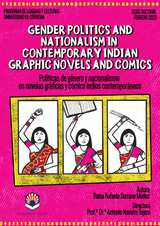Mostrar el registro sencillo del ítem
Gender Politics and Nationalism in Contemporary Indian Graphic Novels and Comics
| dc.contributor.advisor | Navarro Tejero, Antonia | |
| dc.contributor.author | Serrano Muñoz, Raisa Rafaela | |
| dc.date.accessioned | 2023-04-14T08:00:46Z | |
| dc.date.available | 2023-04-14T08:00:46Z | |
| dc.date.issued | 2023 | |
| dc.identifier.uri | http://hdl.handle.net/10396/25115 | |
| dc.description.abstract | This Ph.D. dissertation is motivated by the research of the academic production about how women have been represented within the nationalist discourse of Hindutva, and by the analysis of how certain women writers belonging to the fourth wave of Indian feminism are talking back. The feminist movement is driving scholars, independent artists, and writers to abolish the predominant patriarchal standards in India, responding to and providing alternative approaches in their publications to pre-conceived identities. The selected corpus, graphic novels and comics published online, is a sample of the new paradigm that is been artistically created as a countercurrent response to the ideology promoted by hindutva. The selected corpus consists of three graphic novels: Bhimayana: Experiences Of Untouchability (2011) by Durgabai Subhash Vyam, Kari (2008) by Amruta Patil, and Nirmala and Normala (2014) by Sowmya Rajendran and Niveditha Subramaniam, and three comics: Priya’s Mirror (2016) by Paromita Vohra et al., Drawing the Line: Indian Women Fight Back! (2015) by Priya Kuriyan et al. (an anthology of fourteen comics) and Royal Existentials (2014) by Aarthi Parthasarathy and Chaitanya Krishnan. By means of an overview of the history of India in the construction of the nation regarding gender and caste issues, of all the waves of the Indian women’s movements, and the important role that new technologies play in the social movement and creative production, this Ph.D. dissertation provides the founds for a thematic analysis of the contextualised corpus. Exposing women’s vulnerability and transforming it to resilience, learning through healing stories and resisting in their defense of the movement for a better society are the main methods echoed in the corpus analysed in this dissertation. The originality of this research relays on the approach towards the social contemporary topics discussed in a fiction that has scarcely been studied, and the incorporation of interviews with the authors of the corpus, which complement and inform the arguments of this dissertation. | es_ES |
| dc.description.abstract | Esta tesis doctoral está motivada por la investigación de la producción académica sobre cómo las mujeres han sido representadas en el discurso nacionalista de hindutva y por el análisis de cómo ciertas autoras de la cuarta ola del feminismo en la India están respondiendo. El movimiento feminista está impulsando a académicos y artistas independientes a abolir los estándares patriarcales predominantes en la India, respondiendo y brindando enfoques alternativos en sus publicaciones a las identidades pre-establecidas. El corpus seleccionado, novelas gráficas y cómics publicados en internet, es una muestra de cambio hacia un nuevo paradigma que contraataca el discurso promulgado por hindutva. El presente estudio de investigación está conformado por el análisis de tres novelas gráficas: Bhimayana: Experiences of Untouchability (2011) de Durgabai Subhash Vyam, Kari (2008) de Amruta Patil y Nirmala and Normala (2014) de Sowmya Rajendran y Niveditha Subramaniam; y por tres cómics: Priya’s Mirror (2016) de Paromita Vohra et al., Drawing the Line: Indian Women Fight Back! (2015) de Priya Kuriyan et al. (una antología dividida en catorce comics) y Royal Existentials (2014) de Aarthi Parthasarathy y Chaitanya Krishnan. A través de un recorrido por la historia del país en su construcción de la nación en relación con las premisas de género y casta, por todas las fases del movimiento de mujeres en India y el papel que juegan las nuevas tecnologías en el movimiento social y producción creativa, esta tesis doctoral expone las bases para dar paso a un análisis temático, contextualizado del corpus seleccionado. Exponer la vulnerabilidad de las mujeres y transformarla en resiliencia, crecer a través de historias de sanación y resistir en su defensa por una sociedad mejor son los principales métodos que se hacen eco en el corpus analizado en esta disertación. La originalidad de misma reside en el abordaje de los temas sociales contemporáneos a la presente investigación en una obra escasamente estudiada, y la inclusión de una serie de entrevistas con las autoras de las obras seleccionadas que complementan y apoyan los argumentos de esta tesis doctoral. | es_ES |
| dc.format.mimetype | application/pdf | es_ES |
| dc.language.iso | eng | es_ES |
| dc.publisher | Universidad de Córdoba, UCOPress | es_ES |
| dc.rights | https://creativecommons.org/licenses/by-nc-nd/4.0/ | es_ES |
| dc.subject | Hindu nationalism | es_ES |
| dc.subject | Hindutva | es_ES |
| dc.subject | Indian women’s movements | es_ES |
| dc.subject | Graphic novels | es_ES |
| dc.subject | Independent comics | es_ES |
| dc.subject | Nacionalismo hindú | es_ES |
| dc.subject | Movimiento de mujeres indias | es_ES |
| dc.subject | Novelas gráficas | es_ES |
| dc.subject | Cómic independiente | es_ES |
| dc.title | Gender Politics and Nationalism in Contemporary Indian Graphic Novels and Comics | es_ES |
| dc.title.alternative | Políticas de género y nacionalismo en novelas gráficas y cómics indios contemporáneos | es_ES |
| dc.type | info:eu-repo/semantics/doctoralThesis | es_ES |
| dc.rights.accessRights | info:eu-repo/semantics/openAccess | es_ES |

